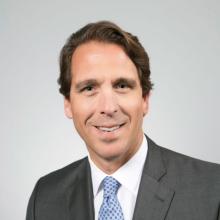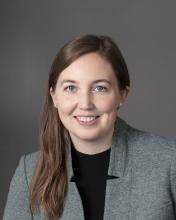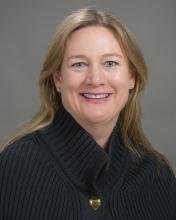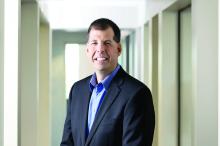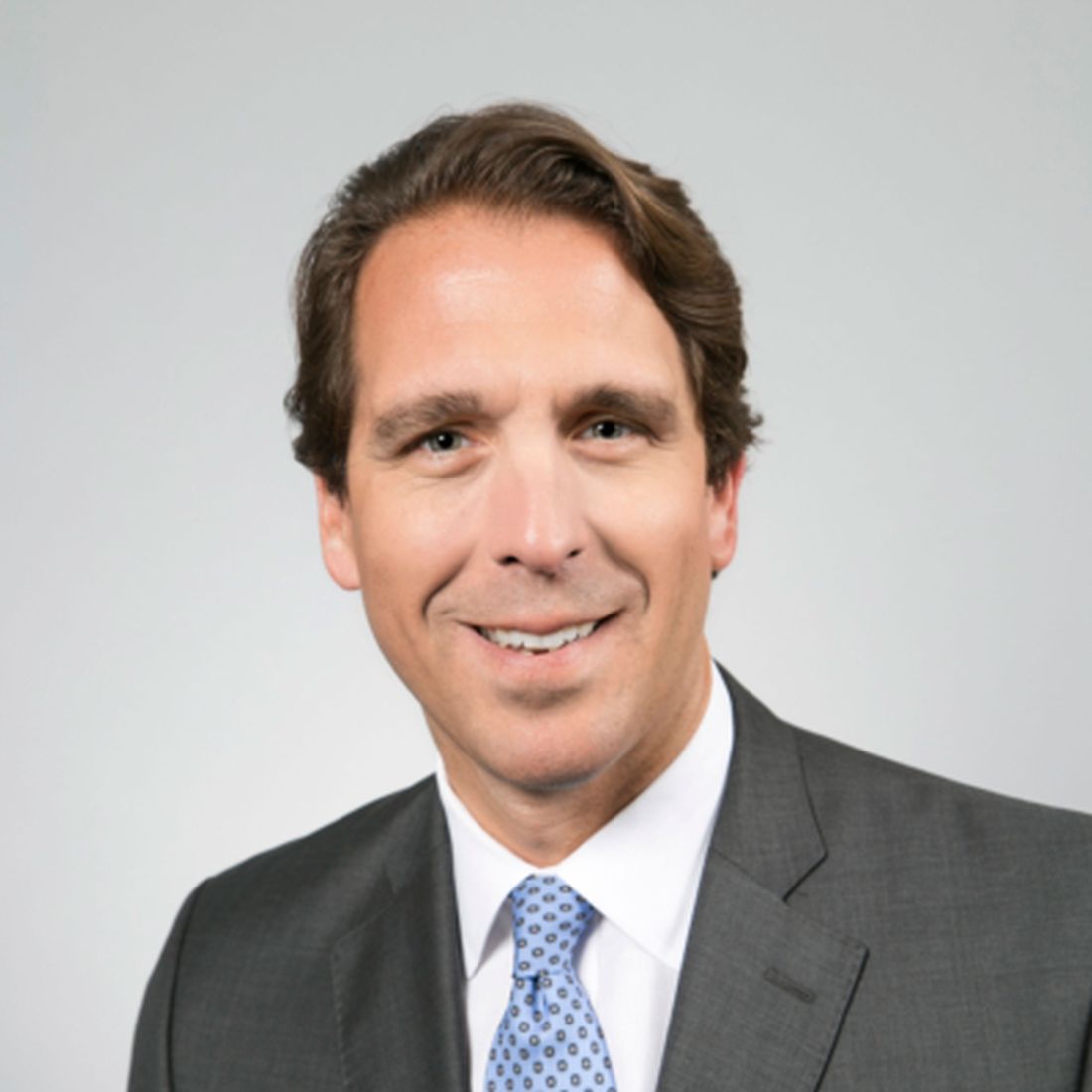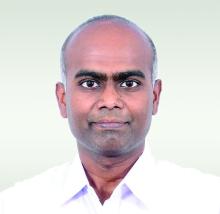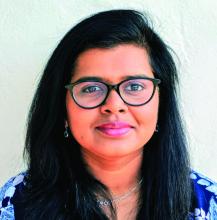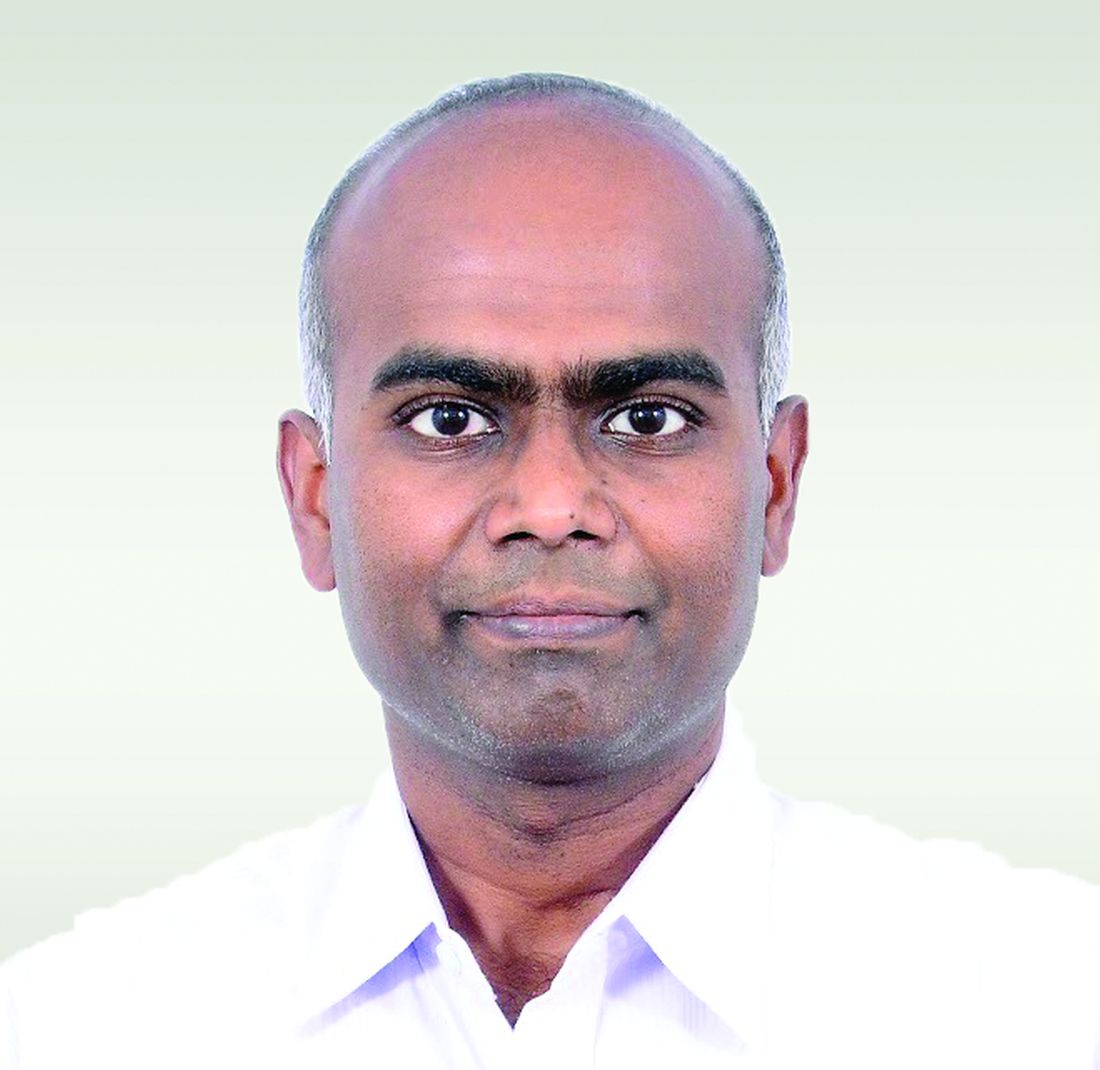User login
Advice, Support for Entrepreneurs at AGA Tech 2024
CHICAGO — Have a great tech idea to improve gastroenterology? Start-up companies have the potential to transform the practice of medicine, and to make founders a nice pot of money, but it is a difficult road. At the 2024 AGA Tech Summit, held at the Chicago headquarters of MATTER, a global healthcare startup incubator, investors and gastroenterologists discussed some of the key challenges and opportunities for GI startups.
The road is daunting, and founders must be dedicated to their companies but also maintain life balance. “It is very easy, following your passion, for your life to get out of check. I don’t know what the divorce rate is for entrepreneurs, but I personally was a victim of that. The culture that we built was addictive and it became all encompassing, and at the same time [I neglected] my home life,” Scott Fraser, managing director of the consulting company Fraser Healthcare, said during a “Scars and Stripes” panel at the summit.
For those willing to navigate those waters, there is help. Investors are prepared to provide seed money for companies with good ideas and a strong market. AGA itself has stepped into the investment field with its GI Opportunity Fund, which it launched in 2022 through a partnership with Varia Ventures. The fund’s capital comes from AGA members, with a minimum investment of $25,000. To date, AGA has made investments in six companies, at around $100,000 per company. “It’s not a large amount that we’re investing. We’re a lead investor that signals to other venture capital companies that this is a viable company,” Tom Serena, CEO of AGA, said in an interview.
The fund grew out of AGA’s commitment to boosting early-stage companies in the gastroenterology space. AGA has always supported GI device and tech companies through its Center for GI Innovation and Technology, which sponsored the AGA Tech Summit. The center now provides resources and advice for GI innovators and startups. The AGA Tech Summit has created a gathering place for entrepreneurs and innovators to share their experiences and learn from one another. “But what we were missing was the last mile, which is getting funding to the companies,” said Mr. Serena. The summit itself has been modified to increase the venture capital presence. “That’s the networking we’re trying to [create] here. Venture capitalists are well acquainted with these companies, but we feel that AGA can bring clinical due diligence, and the startups want to be exposed to venture capital,” said Mr. Serena.
During the “Learn from VC Strategists” panel, investors shared advice for entrepreneurs. The emphasis throughout was on marketable ideas that can fundamentally change healthcare practice, though inventions may not have the whiz-bang appeal of some new technologies of years past.
“We’re particularly focused on clinical models that actually work. There were a lot of companies for many years that were doing things that had minimal impact, or very incremental impact. Maybe they were helping identify certain patients, but they weren’t actually engaging those patients. We’re now looking very end-to-end and trying to make sure that it’s not just a good idea, but one that you can actually roll out, engage patients, and see the [return on investment] in that patient data,” said Kelsey Maguire, managing director of the Blue Venture Fund, which is a collaborative effort across Blue Cross Blue Shield companies.
Part of the reason for that shift is that healthcare has evolved in a way that has put more pressure on physicians, according to Barbara H. Jung, MD, AGAF, past president of AGA, who was present for the session. “I think that there’s huge burnout among gastroenterologists, [partly because] some of the systems have been optimized to get the most out of each specialist. I think we just have to get back to making work more enjoyable. [It could be less] fighting with the insurance companies, it could be that you spend less time typing after hours. It could be that it helps the team work more seamlessly, or it could be something that helps the patient prepare, so they have everything ready when they see the doctors. It’s thinking about how healthcare is delivered, and really in a patient and physician-centric way,” Dr. Jung said in an interview.
Anna Haghgooie, managing director of Valtruis, noted that, historically, new technology has been rewarded by the healthcare system. “It’s part of why we find ourselves where we are as an industry: There was nobody in the marketplace that was incented to roll out a cost-reducing technology, and those weren’t necessarily considered grand slams. But [I think] we’re at a tipping point on cost, and as a country will start purchasing in pretty meaningfully different ways, which opens up a lot of opportunities for those practical solutions to be grand slams. Everything that we look at has a component of virtual care, leveraging technology, whether it’s AI or just better workflow tools, better data and intelligence to make business decisions,” said Ms. Haghgooie. She did note that Valtruis does not work much with medical devices.
Specifically in the GI space, one panelist called for a shift away from novel colonoscopy technology. “I don’t know how many more bells and whistles we can ask for colonoscopy, which we’re very dependent on. Not that it’s not important, but I don’t think that’s where the real innovation is going to come. When you think about the cognitive side of the GI business: New diagnostics, things that are predictive of disease states, things that monitor disease, things that help you to know what people’s disease courses will be. I think as more and more interventions are done by endoscopists, you need more tools,” said Thomas Shehab, MD, managing partner at Arboretum Ventures.
Finally, AI has become a central component to investment decisions. Ms. Haghgooie said that Valtruis is focused on the infrastructure surrounding AI, such as the data that it requires to make or help guide decisions. That data can vary widely in quality, is difficult to index, exists in various silos, and is subject to a number of regulatory constraints on how to move or aggregate it. “So, a lot of what we’re focused on are the systems and tools that can enable the next gen application of AI. That’s one piece of the puzzle. The other is, I’d say that every company that we’ve either invested in or are looking at investing in, we ask the question: How are you planning to incorporate and leverage this next gen technology to drive your marginal cost-to-deliver down? In many cases you have to do that through business model redesign, because there is no fee-for-service code to get paid for leveraging AI to reduce your costs. You’ve got to have different payment structures in order to get the benefit of leveraging those types of technologies. When we’re sourcing and looking at deals, we’re looking at both of those angles,” she said.
CHICAGO — Have a great tech idea to improve gastroenterology? Start-up companies have the potential to transform the practice of medicine, and to make founders a nice pot of money, but it is a difficult road. At the 2024 AGA Tech Summit, held at the Chicago headquarters of MATTER, a global healthcare startup incubator, investors and gastroenterologists discussed some of the key challenges and opportunities for GI startups.
The road is daunting, and founders must be dedicated to their companies but also maintain life balance. “It is very easy, following your passion, for your life to get out of check. I don’t know what the divorce rate is for entrepreneurs, but I personally was a victim of that. The culture that we built was addictive and it became all encompassing, and at the same time [I neglected] my home life,” Scott Fraser, managing director of the consulting company Fraser Healthcare, said during a “Scars and Stripes” panel at the summit.
For those willing to navigate those waters, there is help. Investors are prepared to provide seed money for companies with good ideas and a strong market. AGA itself has stepped into the investment field with its GI Opportunity Fund, which it launched in 2022 through a partnership with Varia Ventures. The fund’s capital comes from AGA members, with a minimum investment of $25,000. To date, AGA has made investments in six companies, at around $100,000 per company. “It’s not a large amount that we’re investing. We’re a lead investor that signals to other venture capital companies that this is a viable company,” Tom Serena, CEO of AGA, said in an interview.
The fund grew out of AGA’s commitment to boosting early-stage companies in the gastroenterology space. AGA has always supported GI device and tech companies through its Center for GI Innovation and Technology, which sponsored the AGA Tech Summit. The center now provides resources and advice for GI innovators and startups. The AGA Tech Summit has created a gathering place for entrepreneurs and innovators to share their experiences and learn from one another. “But what we were missing was the last mile, which is getting funding to the companies,” said Mr. Serena. The summit itself has been modified to increase the venture capital presence. “That’s the networking we’re trying to [create] here. Venture capitalists are well acquainted with these companies, but we feel that AGA can bring clinical due diligence, and the startups want to be exposed to venture capital,” said Mr. Serena.
During the “Learn from VC Strategists” panel, investors shared advice for entrepreneurs. The emphasis throughout was on marketable ideas that can fundamentally change healthcare practice, though inventions may not have the whiz-bang appeal of some new technologies of years past.
“We’re particularly focused on clinical models that actually work. There were a lot of companies for many years that were doing things that had minimal impact, or very incremental impact. Maybe they were helping identify certain patients, but they weren’t actually engaging those patients. We’re now looking very end-to-end and trying to make sure that it’s not just a good idea, but one that you can actually roll out, engage patients, and see the [return on investment] in that patient data,” said Kelsey Maguire, managing director of the Blue Venture Fund, which is a collaborative effort across Blue Cross Blue Shield companies.
Part of the reason for that shift is that healthcare has evolved in a way that has put more pressure on physicians, according to Barbara H. Jung, MD, AGAF, past president of AGA, who was present for the session. “I think that there’s huge burnout among gastroenterologists, [partly because] some of the systems have been optimized to get the most out of each specialist. I think we just have to get back to making work more enjoyable. [It could be less] fighting with the insurance companies, it could be that you spend less time typing after hours. It could be that it helps the team work more seamlessly, or it could be something that helps the patient prepare, so they have everything ready when they see the doctors. It’s thinking about how healthcare is delivered, and really in a patient and physician-centric way,” Dr. Jung said in an interview.
Anna Haghgooie, managing director of Valtruis, noted that, historically, new technology has been rewarded by the healthcare system. “It’s part of why we find ourselves where we are as an industry: There was nobody in the marketplace that was incented to roll out a cost-reducing technology, and those weren’t necessarily considered grand slams. But [I think] we’re at a tipping point on cost, and as a country will start purchasing in pretty meaningfully different ways, which opens up a lot of opportunities for those practical solutions to be grand slams. Everything that we look at has a component of virtual care, leveraging technology, whether it’s AI or just better workflow tools, better data and intelligence to make business decisions,” said Ms. Haghgooie. She did note that Valtruis does not work much with medical devices.
Specifically in the GI space, one panelist called for a shift away from novel colonoscopy technology. “I don’t know how many more bells and whistles we can ask for colonoscopy, which we’re very dependent on. Not that it’s not important, but I don’t think that’s where the real innovation is going to come. When you think about the cognitive side of the GI business: New diagnostics, things that are predictive of disease states, things that monitor disease, things that help you to know what people’s disease courses will be. I think as more and more interventions are done by endoscopists, you need more tools,” said Thomas Shehab, MD, managing partner at Arboretum Ventures.
Finally, AI has become a central component to investment decisions. Ms. Haghgooie said that Valtruis is focused on the infrastructure surrounding AI, such as the data that it requires to make or help guide decisions. That data can vary widely in quality, is difficult to index, exists in various silos, and is subject to a number of regulatory constraints on how to move or aggregate it. “So, a lot of what we’re focused on are the systems and tools that can enable the next gen application of AI. That’s one piece of the puzzle. The other is, I’d say that every company that we’ve either invested in or are looking at investing in, we ask the question: How are you planning to incorporate and leverage this next gen technology to drive your marginal cost-to-deliver down? In many cases you have to do that through business model redesign, because there is no fee-for-service code to get paid for leveraging AI to reduce your costs. You’ve got to have different payment structures in order to get the benefit of leveraging those types of technologies. When we’re sourcing and looking at deals, we’re looking at both of those angles,” she said.
CHICAGO — Have a great tech idea to improve gastroenterology? Start-up companies have the potential to transform the practice of medicine, and to make founders a nice pot of money, but it is a difficult road. At the 2024 AGA Tech Summit, held at the Chicago headquarters of MATTER, a global healthcare startup incubator, investors and gastroenterologists discussed some of the key challenges and opportunities for GI startups.
The road is daunting, and founders must be dedicated to their companies but also maintain life balance. “It is very easy, following your passion, for your life to get out of check. I don’t know what the divorce rate is for entrepreneurs, but I personally was a victim of that. The culture that we built was addictive and it became all encompassing, and at the same time [I neglected] my home life,” Scott Fraser, managing director of the consulting company Fraser Healthcare, said during a “Scars and Stripes” panel at the summit.
For those willing to navigate those waters, there is help. Investors are prepared to provide seed money for companies with good ideas and a strong market. AGA itself has stepped into the investment field with its GI Opportunity Fund, which it launched in 2022 through a partnership with Varia Ventures. The fund’s capital comes from AGA members, with a minimum investment of $25,000. To date, AGA has made investments in six companies, at around $100,000 per company. “It’s not a large amount that we’re investing. We’re a lead investor that signals to other venture capital companies that this is a viable company,” Tom Serena, CEO of AGA, said in an interview.
The fund grew out of AGA’s commitment to boosting early-stage companies in the gastroenterology space. AGA has always supported GI device and tech companies through its Center for GI Innovation and Technology, which sponsored the AGA Tech Summit. The center now provides resources and advice for GI innovators and startups. The AGA Tech Summit has created a gathering place for entrepreneurs and innovators to share their experiences and learn from one another. “But what we were missing was the last mile, which is getting funding to the companies,” said Mr. Serena. The summit itself has been modified to increase the venture capital presence. “That’s the networking we’re trying to [create] here. Venture capitalists are well acquainted with these companies, but we feel that AGA can bring clinical due diligence, and the startups want to be exposed to venture capital,” said Mr. Serena.
During the “Learn from VC Strategists” panel, investors shared advice for entrepreneurs. The emphasis throughout was on marketable ideas that can fundamentally change healthcare practice, though inventions may not have the whiz-bang appeal of some new technologies of years past.
“We’re particularly focused on clinical models that actually work. There were a lot of companies for many years that were doing things that had minimal impact, or very incremental impact. Maybe they were helping identify certain patients, but they weren’t actually engaging those patients. We’re now looking very end-to-end and trying to make sure that it’s not just a good idea, but one that you can actually roll out, engage patients, and see the [return on investment] in that patient data,” said Kelsey Maguire, managing director of the Blue Venture Fund, which is a collaborative effort across Blue Cross Blue Shield companies.
Part of the reason for that shift is that healthcare has evolved in a way that has put more pressure on physicians, according to Barbara H. Jung, MD, AGAF, past president of AGA, who was present for the session. “I think that there’s huge burnout among gastroenterologists, [partly because] some of the systems have been optimized to get the most out of each specialist. I think we just have to get back to making work more enjoyable. [It could be less] fighting with the insurance companies, it could be that you spend less time typing after hours. It could be that it helps the team work more seamlessly, or it could be something that helps the patient prepare, so they have everything ready when they see the doctors. It’s thinking about how healthcare is delivered, and really in a patient and physician-centric way,” Dr. Jung said in an interview.
Anna Haghgooie, managing director of Valtruis, noted that, historically, new technology has been rewarded by the healthcare system. “It’s part of why we find ourselves where we are as an industry: There was nobody in the marketplace that was incented to roll out a cost-reducing technology, and those weren’t necessarily considered grand slams. But [I think] we’re at a tipping point on cost, and as a country will start purchasing in pretty meaningfully different ways, which opens up a lot of opportunities for those practical solutions to be grand slams. Everything that we look at has a component of virtual care, leveraging technology, whether it’s AI or just better workflow tools, better data and intelligence to make business decisions,” said Ms. Haghgooie. She did note that Valtruis does not work much with medical devices.
Specifically in the GI space, one panelist called for a shift away from novel colonoscopy technology. “I don’t know how many more bells and whistles we can ask for colonoscopy, which we’re very dependent on. Not that it’s not important, but I don’t think that’s where the real innovation is going to come. When you think about the cognitive side of the GI business: New diagnostics, things that are predictive of disease states, things that monitor disease, things that help you to know what people’s disease courses will be. I think as more and more interventions are done by endoscopists, you need more tools,” said Thomas Shehab, MD, managing partner at Arboretum Ventures.
Finally, AI has become a central component to investment decisions. Ms. Haghgooie said that Valtruis is focused on the infrastructure surrounding AI, such as the data that it requires to make or help guide decisions. That data can vary widely in quality, is difficult to index, exists in various silos, and is subject to a number of regulatory constraints on how to move or aggregate it. “So, a lot of what we’re focused on are the systems and tools that can enable the next gen application of AI. That’s one piece of the puzzle. The other is, I’d say that every company that we’ve either invested in or are looking at investing in, we ask the question: How are you planning to incorporate and leverage this next gen technology to drive your marginal cost-to-deliver down? In many cases you have to do that through business model redesign, because there is no fee-for-service code to get paid for leveraging AI to reduce your costs. You’ve got to have different payment structures in order to get the benefit of leveraging those types of technologies. When we’re sourcing and looking at deals, we’re looking at both of those angles,” she said.
FROM THE 2024 AGA TECH SUMMIT
AI Wins AGA’s Shark Tank Competition
CHICAGO — At the 2024 AGA Tech Summit, held April 11-12 at the Chicago headquarters of MATTER, a global healthcare startup incubator, five companies made their pitch to be the winner of the Shark Tank competition that recognizes an outstanding tech start up in the gastroenterology field.
After the companies’ rapid-fire pitches and Q&A sessions, four judges convened to determine a winner and returned to make an announcement.
The winner was Arithmedics, which uses AI technology to automate billing codes. Founder Venthan Elango, PhD, has worked as a software engineer at Google, Urban Engines, and Georgia Tech, and his wife of 17 years is Renumathy Dhanasekaran, MD, PhD, a gastroenterologist and assistant professor of medicine at Stanford (California) University.
Their marriage has brought a unique perspective, according to Dr. Elango. “There isn’t a single day that goes by when she talks to me about the inefficiencies in healthcare, and then I say, ‘this can be easily solved with a software solution,’ ” he said.
When they decided to try a start-up, the two initiated conversations with healthcare providers to identify a key unmet need. “The common recurring theme was that medical billing was a problem, because of [insufficient] institutional knowledge, staff shortage, and inconsistencies with the payers,” said Dr. Elango. During their presentation, the two noted that about 80% of claims include at least one coding error, and this leads to an estimated $125 billion in annual losses.
Generative AI presented a solution. “Automating the medical billing code [determination] from a clinical record became 10 times easier than what it was before. So I thought, I can build a product that actually brings in augmented analytics and generative AI and do something that is tremendously useful to physicians,” he said.
The future goal is to make life easier for healthcare providers, according to Dr. Dhanasekaran. “As physicians, we went into medicine to talk with patients, but a lot of us are just typing away when patients are sitting in the room, because there are all of these requirements for documentation to get the billing so that we can get paid at the end of the day,” she said.
Arithmedics aims to initially target small-group medical practices that are tech savvy. They will analyze a year’s worth of claims for errors and resubmit claims for the past 3 months and split any additional revenue that ensues. They plan to expand to revenue cycle management companies and hospital systems. On the technology side, they will expand to data intelligence and integrate with electronic health records, and ultimately plan to charge 1%-2% of revenue.
The other Shark Tank finalists were:
- Aspero Medical: Balloon overtube that maximizes frictional properties to improve mucosal wall traction and anchoring consistency. (Voted ‘fan favorite’ by AGA Tech Summit attendees)
- Aurora Medical Technologies: Minimally invasive, guided, tissue-anchoring suturing system for complex endoscopic procedures.
- Ergami Endoscopy: Flexible overtube capable of automatic insertion and fixation in the colon, which could potentially eliminate sedation and prevent endoscopic injuries to the physician.
- Lazurite: Wireless surgical camera that eliminates the need for light or video cables, avoiding the associated fire, trip, and contamination hazards.
The judges were swayed by Arithmedics’ practical solution to a widespread problem. “There is for sure a need in terms of inaccurate billing and billing codes that are wrong. There’s lost revenue for physicians around that. So I think we were really focused from a judging standpoint on the fact that their solution was filling truly an unmet need,” said judge Andrea Vossler, a managing director of Varia Ventures, which has partnered with AGA to launch and manage the GI Opportunity Fund, an AGA-member venture fund.
“We were really focused on how to assist physicians in terms of supporting their practices, and really changing what you’re doing. I think AI has the ability to do that, so we liked that about the company,” she added.
The company is an example of how AI is poised to alter healthcare, according to Ms. Vossler. “I think it’s massive. I think we’re at the very beginning of its impact on healthcare,” she said.
Another judge had a similar view. “They won because there is a screaming need to fix billing. So, it’s well known that lots of money is indeed lost in billing practices, which are stressful for office personnel and stressful for physicians. They can fulfill a long-standing need, and we thought that that was the success story,” said Christopher Gostout, MD, emeritus professor of medicine at Mayo Clinic in Rochester, Minnesota.
Dr. Gostout offered advice for gastroenterologists and other physicians interested in starting tech companies. It’s imperative to be a realist, he said. “Is there a real market for it, or [is it just] a niche market? Does your device have legs — can it expand and can evolve into other [spin-off] products? These are things you need to think about because one-offs or single-trick ponies are pretty hard to move along now,” said Dr. Gostout.
He recommended that entrepreneurs apply for Small Business Innovation Research (SBIR) grants. “I think it’s a great opportunity to bring in money and get the ball rolling.”
Finally, he advised entrepreneurs to be thoughtful about their advisory groups. Founders may be tempted to find the highest profile names they can to give the business gravitas, but those big names may not have the best knowledge base to understand the problems that the technology is meant to address. “I’ve seen businesses fail because they went for marquee names that really were not helpful, and they didn’t do their due diligence in seeking out really useful value. You don’t need a lot of advisers, just a couple of really good ones,” said Dr. Gostout.
The summit was sponsored by the AGA Center for GI Innovation and Technology.
Dr. Gostout has founded and advises AdaptivEndo and Lean Medical. He is a consultant to Boston Scientific. Dr. Dhanasekaran has no financial disclosures. Ms. Vossler is an employee of Varia Ventures, which is an investment partner to AGA. Dr. Elango is an employee of Arithmedics.
CHICAGO — At the 2024 AGA Tech Summit, held April 11-12 at the Chicago headquarters of MATTER, a global healthcare startup incubator, five companies made their pitch to be the winner of the Shark Tank competition that recognizes an outstanding tech start up in the gastroenterology field.
After the companies’ rapid-fire pitches and Q&A sessions, four judges convened to determine a winner and returned to make an announcement.
The winner was Arithmedics, which uses AI technology to automate billing codes. Founder Venthan Elango, PhD, has worked as a software engineer at Google, Urban Engines, and Georgia Tech, and his wife of 17 years is Renumathy Dhanasekaran, MD, PhD, a gastroenterologist and assistant professor of medicine at Stanford (California) University.
Their marriage has brought a unique perspective, according to Dr. Elango. “There isn’t a single day that goes by when she talks to me about the inefficiencies in healthcare, and then I say, ‘this can be easily solved with a software solution,’ ” he said.
When they decided to try a start-up, the two initiated conversations with healthcare providers to identify a key unmet need. “The common recurring theme was that medical billing was a problem, because of [insufficient] institutional knowledge, staff shortage, and inconsistencies with the payers,” said Dr. Elango. During their presentation, the two noted that about 80% of claims include at least one coding error, and this leads to an estimated $125 billion in annual losses.
Generative AI presented a solution. “Automating the medical billing code [determination] from a clinical record became 10 times easier than what it was before. So I thought, I can build a product that actually brings in augmented analytics and generative AI and do something that is tremendously useful to physicians,” he said.
The future goal is to make life easier for healthcare providers, according to Dr. Dhanasekaran. “As physicians, we went into medicine to talk with patients, but a lot of us are just typing away when patients are sitting in the room, because there are all of these requirements for documentation to get the billing so that we can get paid at the end of the day,” she said.
Arithmedics aims to initially target small-group medical practices that are tech savvy. They will analyze a year’s worth of claims for errors and resubmit claims for the past 3 months and split any additional revenue that ensues. They plan to expand to revenue cycle management companies and hospital systems. On the technology side, they will expand to data intelligence and integrate with electronic health records, and ultimately plan to charge 1%-2% of revenue.
The other Shark Tank finalists were:
- Aspero Medical: Balloon overtube that maximizes frictional properties to improve mucosal wall traction and anchoring consistency. (Voted ‘fan favorite’ by AGA Tech Summit attendees)
- Aurora Medical Technologies: Minimally invasive, guided, tissue-anchoring suturing system for complex endoscopic procedures.
- Ergami Endoscopy: Flexible overtube capable of automatic insertion and fixation in the colon, which could potentially eliminate sedation and prevent endoscopic injuries to the physician.
- Lazurite: Wireless surgical camera that eliminates the need for light or video cables, avoiding the associated fire, trip, and contamination hazards.
The judges were swayed by Arithmedics’ practical solution to a widespread problem. “There is for sure a need in terms of inaccurate billing and billing codes that are wrong. There’s lost revenue for physicians around that. So I think we were really focused from a judging standpoint on the fact that their solution was filling truly an unmet need,” said judge Andrea Vossler, a managing director of Varia Ventures, which has partnered with AGA to launch and manage the GI Opportunity Fund, an AGA-member venture fund.
“We were really focused on how to assist physicians in terms of supporting their practices, and really changing what you’re doing. I think AI has the ability to do that, so we liked that about the company,” she added.
The company is an example of how AI is poised to alter healthcare, according to Ms. Vossler. “I think it’s massive. I think we’re at the very beginning of its impact on healthcare,” she said.
Another judge had a similar view. “They won because there is a screaming need to fix billing. So, it’s well known that lots of money is indeed lost in billing practices, which are stressful for office personnel and stressful for physicians. They can fulfill a long-standing need, and we thought that that was the success story,” said Christopher Gostout, MD, emeritus professor of medicine at Mayo Clinic in Rochester, Minnesota.
Dr. Gostout offered advice for gastroenterologists and other physicians interested in starting tech companies. It’s imperative to be a realist, he said. “Is there a real market for it, or [is it just] a niche market? Does your device have legs — can it expand and can evolve into other [spin-off] products? These are things you need to think about because one-offs or single-trick ponies are pretty hard to move along now,” said Dr. Gostout.
He recommended that entrepreneurs apply for Small Business Innovation Research (SBIR) grants. “I think it’s a great opportunity to bring in money and get the ball rolling.”
Finally, he advised entrepreneurs to be thoughtful about their advisory groups. Founders may be tempted to find the highest profile names they can to give the business gravitas, but those big names may not have the best knowledge base to understand the problems that the technology is meant to address. “I’ve seen businesses fail because they went for marquee names that really were not helpful, and they didn’t do their due diligence in seeking out really useful value. You don’t need a lot of advisers, just a couple of really good ones,” said Dr. Gostout.
The summit was sponsored by the AGA Center for GI Innovation and Technology.
Dr. Gostout has founded and advises AdaptivEndo and Lean Medical. He is a consultant to Boston Scientific. Dr. Dhanasekaran has no financial disclosures. Ms. Vossler is an employee of Varia Ventures, which is an investment partner to AGA. Dr. Elango is an employee of Arithmedics.
CHICAGO — At the 2024 AGA Tech Summit, held April 11-12 at the Chicago headquarters of MATTER, a global healthcare startup incubator, five companies made their pitch to be the winner of the Shark Tank competition that recognizes an outstanding tech start up in the gastroenterology field.
After the companies’ rapid-fire pitches and Q&A sessions, four judges convened to determine a winner and returned to make an announcement.
The winner was Arithmedics, which uses AI technology to automate billing codes. Founder Venthan Elango, PhD, has worked as a software engineer at Google, Urban Engines, and Georgia Tech, and his wife of 17 years is Renumathy Dhanasekaran, MD, PhD, a gastroenterologist and assistant professor of medicine at Stanford (California) University.
Their marriage has brought a unique perspective, according to Dr. Elango. “There isn’t a single day that goes by when she talks to me about the inefficiencies in healthcare, and then I say, ‘this can be easily solved with a software solution,’ ” he said.
When they decided to try a start-up, the two initiated conversations with healthcare providers to identify a key unmet need. “The common recurring theme was that medical billing was a problem, because of [insufficient] institutional knowledge, staff shortage, and inconsistencies with the payers,” said Dr. Elango. During their presentation, the two noted that about 80% of claims include at least one coding error, and this leads to an estimated $125 billion in annual losses.
Generative AI presented a solution. “Automating the medical billing code [determination] from a clinical record became 10 times easier than what it was before. So I thought, I can build a product that actually brings in augmented analytics and generative AI and do something that is tremendously useful to physicians,” he said.
The future goal is to make life easier for healthcare providers, according to Dr. Dhanasekaran. “As physicians, we went into medicine to talk with patients, but a lot of us are just typing away when patients are sitting in the room, because there are all of these requirements for documentation to get the billing so that we can get paid at the end of the day,” she said.
Arithmedics aims to initially target small-group medical practices that are tech savvy. They will analyze a year’s worth of claims for errors and resubmit claims for the past 3 months and split any additional revenue that ensues. They plan to expand to revenue cycle management companies and hospital systems. On the technology side, they will expand to data intelligence and integrate with electronic health records, and ultimately plan to charge 1%-2% of revenue.
The other Shark Tank finalists were:
- Aspero Medical: Balloon overtube that maximizes frictional properties to improve mucosal wall traction and anchoring consistency. (Voted ‘fan favorite’ by AGA Tech Summit attendees)
- Aurora Medical Technologies: Minimally invasive, guided, tissue-anchoring suturing system for complex endoscopic procedures.
- Ergami Endoscopy: Flexible overtube capable of automatic insertion and fixation in the colon, which could potentially eliminate sedation and prevent endoscopic injuries to the physician.
- Lazurite: Wireless surgical camera that eliminates the need for light or video cables, avoiding the associated fire, trip, and contamination hazards.
The judges were swayed by Arithmedics’ practical solution to a widespread problem. “There is for sure a need in terms of inaccurate billing and billing codes that are wrong. There’s lost revenue for physicians around that. So I think we were really focused from a judging standpoint on the fact that their solution was filling truly an unmet need,” said judge Andrea Vossler, a managing director of Varia Ventures, which has partnered with AGA to launch and manage the GI Opportunity Fund, an AGA-member venture fund.
“We were really focused on how to assist physicians in terms of supporting their practices, and really changing what you’re doing. I think AI has the ability to do that, so we liked that about the company,” she added.
The company is an example of how AI is poised to alter healthcare, according to Ms. Vossler. “I think it’s massive. I think we’re at the very beginning of its impact on healthcare,” she said.
Another judge had a similar view. “They won because there is a screaming need to fix billing. So, it’s well known that lots of money is indeed lost in billing practices, which are stressful for office personnel and stressful for physicians. They can fulfill a long-standing need, and we thought that that was the success story,” said Christopher Gostout, MD, emeritus professor of medicine at Mayo Clinic in Rochester, Minnesota.
Dr. Gostout offered advice for gastroenterologists and other physicians interested in starting tech companies. It’s imperative to be a realist, he said. “Is there a real market for it, or [is it just] a niche market? Does your device have legs — can it expand and can evolve into other [spin-off] products? These are things you need to think about because one-offs or single-trick ponies are pretty hard to move along now,” said Dr. Gostout.
He recommended that entrepreneurs apply for Small Business Innovation Research (SBIR) grants. “I think it’s a great opportunity to bring in money and get the ball rolling.”
Finally, he advised entrepreneurs to be thoughtful about their advisory groups. Founders may be tempted to find the highest profile names they can to give the business gravitas, but those big names may not have the best knowledge base to understand the problems that the technology is meant to address. “I’ve seen businesses fail because they went for marquee names that really were not helpful, and they didn’t do their due diligence in seeking out really useful value. You don’t need a lot of advisers, just a couple of really good ones,” said Dr. Gostout.
The summit was sponsored by the AGA Center for GI Innovation and Technology.
Dr. Gostout has founded and advises AdaptivEndo and Lean Medical. He is a consultant to Boston Scientific. Dr. Dhanasekaran has no financial disclosures. Ms. Vossler is an employee of Varia Ventures, which is an investment partner to AGA. Dr. Elango is an employee of Arithmedics.
FROM THE 2024 AGA TECH SUMMIT
